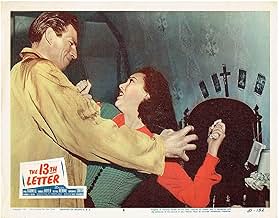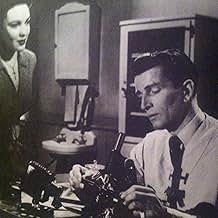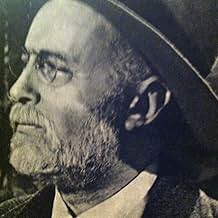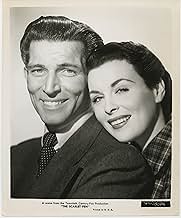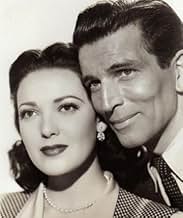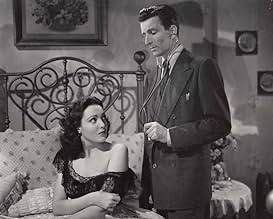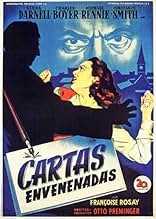CALIFICACIÓN DE IMDb
6.3/10
618
TU CALIFICACIÓN
Agrega una trama en tu idiomaRespectable citizens receive anonymous letters revealing their adulterous relationships.Respectable citizens receive anonymous letters revealing their adulterous relationships.Respectable citizens receive anonymous letters revealing their adulterous relationships.
- Dirección
- Guionistas
- Elenco
George Alexander
- Dr. Fletcher
- (sin créditos)
Jacques Auger
- Priest
- (sin créditos)
Lucie Boitres
- Townswoman
- (sin créditos)
C. Bosvier
- Townsman
- (sin créditos)
Sheila M. Coonan
- Townswoman
- (sin créditos)
Wilford Davidson
- Townsman
- (sin créditos)
Camille Ducharme
- Fredette
- (sin créditos)
J. Léo Gagnon
- Dr. Helier
- (sin créditos)
Blanche Gauthier
- Townswoman
- (sin créditos)
Arthur Groulx
- Townsman
- (sin créditos)
- Dirección
- Guionistas
- Todo el elenco y el equipo
- Producción, taquilla y más en IMDbPro
Opiniones destacadas
1st watched 5/30/2000 - (Dir-Otto Preminger): Well-done whodunit which revolves around a series of letters written supposedly to defame a local doctor in a Canadian town, but ends up becoming more fatal.It keeps you guessing until the end which is pretty much the measuring stick for this kind of movie.
The film stars out as an interesting mystery with an atypical premise. Then it deflates and gives you a disappointing ending.
Boyer is the only Quebecianite who has a French accent and as usual, he really pours it on.
Boyer is the only Quebecianite who has a French accent and as usual, he really pours it on.
I used to think of the Hollywood proclivity toward remaking foreign films in English to be a modern phenomenon until I encountered the 1951 remake of Fritz Lang's German classic "M" from 1939. Well, that comment segues nicely into the American remake of "Le Corbeau." "The 13th Letter" doesn't mention the French film as a source nor the historical incident from the 1920s it is based on but refers back only to the novel. It does pay some homage to its French origins. An opening title tells us that the new movie was filmed in its entirety at a "small French-Canadian community in the Province of Quebec." When I reviewed the Hollywood remake of Fritz Lang's "M" (released the same year as "The 13th Letter" but from different studios), I said that if you could, as much as possible, take the new film on its own merits then it had quite a bit to offer. I can't quite say the same for the Preminger effort. The director doesn't seem to be working too hard for a film that falls between "Where The Sidewalk Ends" and "Angel Face" in his filmography. The new film is not quite a shot-for-shot remake but is pretty much a scene-for-scene redo. The only substantial change is right at the end where a fairly long dialog passage goes to explaining the crimes in a lot more detail than Clouzot provided - but I liked the Clouzot approach better. The new young doctor is played by Michael Rennie who can't come close to showing the inner turmoil that Pierre Fresnay brought to his tormented physician. Linda Darnell is good enough as the landlord's flirty daughter if she isn't nearly as seductive and overtly sexual as the French would have it. The only real notable performance is by Charles Boyer who is quite brilliant as the elderly doctor with the young wife who the anonymous letters continually link to Rennie's character. Howard Koch wrote the screenplay. The cinematographer was Joseph LaShelle (Laura, The Apartment, Marty), so there was talent behind the camera. I can neither recommend or not recommend this picture. See it if curiosity leads you that way. It's not really a bad movie but not a very good one either.
A small Quebec town is rattled by a series of anonymous poison pen letters. Preminger takes a stab at Clouzot's LE CORBEAU (Clouzot himself being one of the finest purveyors of European noir, including LES DIABOLIQUES, THE WAGES OF FEAR and QUAI DES ORFEVRES). I don't recall the original very well, but I do know it had a more biting, cynical edge to it (as well as overt references to abortion, which of course was verboten under the Hays code) as opposed to the moodier tones found here. The subject matter is ripe for common noir themes like the fragility of civilized society and the darkness lurking beneath pleasant facades. Every performance is quite good, especially Michael Rennie and the sultry-as-ever Linda Darnell. The film keeps you guessing and keeps you interested, never playing a hand too soon. Although my copy was rather blurry, I could still appreciate the artful framing and use of light. The score is the weakest aspect, often laying on the strings too thick. Otherwise, quite a fine film.
Nestled in the noir cycle is a trio of movies set in the Canadian province of Québec. Ozep's Whispering City and Hitchcock's I Confess make up the first two, followed by Otto Preminger's The 13th Letter. His strategy in setting it there was probably to preserve the Gallic ambience of the original, Clouzot's Le Corbeau (though that version is accounted more mordant and misanthropic).
Michael Rennie left a prosperous medical practice in London to set up residence in Canada after his unfaithful wife left him and later killed herself. He catches many an eye, as there are few marriageable men in the rural village, though Rennie keeps to himself and dotes on his collection of antique timepieces. But suddenly poison pen letters begin to circulate. At first they hint that Rennie is involved with the wife (Constance Smith) of a prominent doctor at the same hospital (Charles Boyer). Soon the letters take a more malicious turn, causing a young war hero to slit his throat by lying about Rennie's withholding a diagnosis of hopeless cancer. The police investigate, and the campaign of libel becomes a political cause celebre.
Rennie, meanwhile, slowly succumbs to the charms of Linda Darnell, who feigns ailments to coax him up to her rooms; beautiful but lonely, she's acutely sensitive when Rennie discovers the club foot she takes pains to conceal. She, too, falls under suspicion, along with many others as the letters continue to come....
Preminger handles the story with slow, modulated suspense, never resorting to shock tactics; his cast uniformly delivers restrained, effective performances (Rennie has never been so good). Distant thunder crackles constantly under the lowering skies, well shot by Joseph LaShelle, adding to the claustrophobic feel of provincial insularity. Yet this superior suspense film languishes in obscurity despite being one of the often dismissed Preminger's better works in the cycle, along with Fallen Angel, Where The Sidewalk Ends, Angel Face and of course Laura.
Michael Rennie left a prosperous medical practice in London to set up residence in Canada after his unfaithful wife left him and later killed herself. He catches many an eye, as there are few marriageable men in the rural village, though Rennie keeps to himself and dotes on his collection of antique timepieces. But suddenly poison pen letters begin to circulate. At first they hint that Rennie is involved with the wife (Constance Smith) of a prominent doctor at the same hospital (Charles Boyer). Soon the letters take a more malicious turn, causing a young war hero to slit his throat by lying about Rennie's withholding a diagnosis of hopeless cancer. The police investigate, and the campaign of libel becomes a political cause celebre.
Rennie, meanwhile, slowly succumbs to the charms of Linda Darnell, who feigns ailments to coax him up to her rooms; beautiful but lonely, she's acutely sensitive when Rennie discovers the club foot she takes pains to conceal. She, too, falls under suspicion, along with many others as the letters continue to come....
Preminger handles the story with slow, modulated suspense, never resorting to shock tactics; his cast uniformly delivers restrained, effective performances (Rennie has never been so good). Distant thunder crackles constantly under the lowering skies, well shot by Joseph LaShelle, adding to the claustrophobic feel of provincial insularity. Yet this superior suspense film languishes in obscurity despite being one of the often dismissed Preminger's better works in the cycle, along with Fallen Angel, Where The Sidewalk Ends, Angel Face and of course Laura.
¿Sabías que…?
- TriviaJoseph Cotten was the first actor to be approached for the role of "Dr. Pearson", and, after he had dropped out, Richard Todd was briefly considered for the role. Michael Rennie had recently had prominent supporting roles in two big Twentieth Century Fox movies made in Europe - "The Black Rose" and "The House In The Square" - and the studio was hoping to build him into a Hollywood leading man. This was his first film in America.
Selecciones populares
Inicia sesión para calificar y agrega a la lista de videos para obtener recomendaciones personalizadas
- How long is The 13th Letter?Con tecnología de Alexa
Detalles
- Fecha de lanzamiento
- País de origen
- Idiomas
- También se conoce como
- The 13th Letter
- Locaciones de filmación
- St.Hilaire, Quebec, Canadá(On the Richelieu River)
- Productora
- Ver más créditos de la compañía en IMDbPro
- Tiempo de ejecución
- 1h 25min(85 min)
- Color
- Relación de aspecto
- 1.37 : 1
Contribuir a esta página
Sugiere una edición o agrega el contenido que falta

